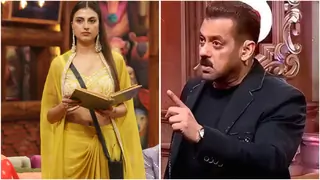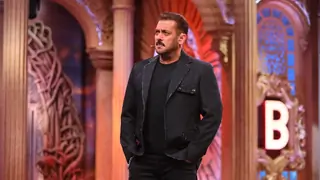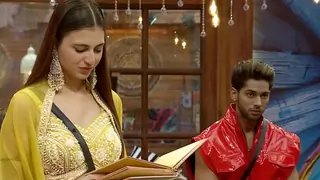Originally posted by: RadhikaS0
Hi Abhay
Great writeup :) 👏
The episode was fantastic. It was totally Jodha's episode today, just as Jalal had held sway on Thursday. Paridhi carried the show gracefully and superbly on the strength of her facial expressions and eyes.
The episode was a test of Jodha's inner strength and I do not remember when I felt so heartbroken and desolate the last time, in all these months of JA.
I really do not want to believe that Jodha will actually secretly convert on Monday. It doesn't matter what happened in history or what can be shown as part of NR. What is important here right now is:
- A question of Jalal's principles
- His support to Jodha in the face of all opposition
- His request to her to stick to her ideals and never to give in to pressure
A Question of Jalal's Principles
Jalal has certain principles on which he is not willing to compromise and rightly so.
1. He understands that he will be declaring himself to be a vassal of the Shah-i-Iran for life, if he gives in to the Shah this time. The issue may be anything, but the consequence of following the Shah's advice will be disastrous for Jalal - he will never be able to stamp his authority as the Emperor of Hindustan.
2.
He knows that his father and grandfather had to take help from the Safavids earlier due to circumstances and had been forced to accept the shia taj. He knows that even then, they tried to shake off the yoke of the Safavids in small ways. Babur, for instance, struck coins bearing the names of the first 4 khalifas, going against shia loyalty. (
Link)
Jalal knows all this and understands the political games being played out in Central Asia better than his mother, who can only see the so-called favors done by the Shahs. She doesn't understand the price the early Mughals had to pay for those "favors".
3. It is esp galling for Jalal to accept external interference in his "personal life". He cannot accept anyone telling him to force his wife to change her faith. He had even been willing to give up his throne for her right to her faith earlier. And since the issue started, he has seen that the Shah has been creating many problems for him - the Taj poshi of Salim had to be stopped, the Haj rights of the awaam were taken away and now his daughter's engagement was broken. His sons were fighting for the throne.
He knows it is time to put an end to all this in order to protect his family and their interests.
4. He knows that it is not merely a question of one person - Jodha's - conversion, as Hamida and others see it. It is a question of the majority of his awaam also, who can be pressured to convert later if the queen herself is forced to convert.
Here Jodha's right to her faith is symbolic of the right of every subject in the empire to follow their faith. And as the ruler, he has to protect this right for everyone's sake.
5. Jalal is caught in a trap. He is doomed to lose his respect among the people if he gives in to the Shah's unjust demands. He is also doomed to lose their respect if he is seen to be opposing the religious tenets of an authority figure. But he is more inclined to show the people his own authority than the authority of an external person.
He wants to rule Hindustan the way his grandfather had advised his father - by respecting every person's faith and not imposing his own beliefs on them. When he is not in favor of imposing even his own beliefs on the awaam, how can he impose the Shah's beliefs on his awaam?
His support to Jodha in the face of all opposition
Jalal has unequivocally supported Jodha's right to follow her faith ever since he agreed to her pre-marital conditions. He was even ready to give up his throne once for this.
Even now, in spite of all the problems he is facing as a king and personally, he is not willing to make her do something that he knows will kill her soul, her very being. He has been time and again reassuring her of his support and trying to make her understand that she does not have to give in to emotional pressure of any kind and convert unwillingly.
For Jalal, his faith is very important and so is the faith of his wife. He does not want anyone to accept Islam against their wishes because he feels this is going against the tenets of Islam. He would rather Jodha follow her own faith with complete devotion to God than follow Islam half-heartedly.
He knows that it is simply a matter of calling. Jodha has been devoted to Kanha since childhood and cannot be expected to change that now. He also knows that she respects his faith - she has kept roza, done namaz and been to dargahs with him. For him, this regular expression of respect for his faith is more important than any outward profession of faith that does not carry the convictions of her heart. In all these years, he has come to love her Kanha the way she has come to love the tenets of his faith. And it would be heart-breaking for him to take her away from her Kanha as much as it would be gut-wrenching for her to give up Kanha.
As a husband and as an emperor, it would be his ultimate defeat if he cannot even give enough security to his wife to follow her customs that define her very nature and personality.
Jalal, in short, wants that he and Jodha should follow BOTH faiths together in a path-breaking symbolic gesture to the awaam rather than giving up on one of the faiths. This would be a reiteration of the emperor's protection of and commitment to every subject's right to live life the way he/she wants to and to follow such faith as gives them happiness and guidance in their daily lives.
His request to her to stick to her ideals and never to give in to pressure
Just like you, Abhay, I also found this scene extremely meaningful and symbolic. For the first time, Jalal is officially leaving the empire in the hands of the MEH/MUZ.
Till now, the empire had been handled by his ministers, by MM and by Salima Begum in his absence. Now he is handing over the reins to his wife and the person whom he trusts the most, his veritable shadow.
I had always despaired that the CVs would never show Jodha actually wielding any power or influence but this seems to be changing now. Thank you, CVs, for this beautiful scene.
I didn't realise at the time but the dialogs were indeed significant in the light of what followed.
Jalal loves Jodha because like him, she is an idealist who puts duty and principles before everything else. And he so wants her to be the same person even as an Empress. He knows it is easier for an individual to be principled than for a ruler. A ruler has to face pressure from many quarters and still be able to take the right decisions. He knows Jodha has the potential, which is why he chose her over others to be the MEH. But he also knows that she is emotional, sensitive and vulnerable to giving in to the demands of others out of the generosity of her heart.
It is this soft side of her nature that he is afraid, will be misused by people for their own advantage.
In recent weeks, we have seen Jalal spending more time with Jodha and apparently romancing her a lot, some may feel neglecting his duties and the crises facing the empire/ family.
But after yesterday's episode, I finally realised what Jalal had been trying to do all this while. He was slowly, indirectly convincing her to stick to her guns, take uncomfortable / unpopular decisions and not flinch in the face of criticism.
All the scenes that happened between them, if we look beyond the teasing and the banter, - the puja scene, the scene following the puja scene, the chess scene, the scene when Jodha first proposed to convert, the tarazu scenes, the many scenes in which Jodha kept questioning him about Salim's future and present pain - they all show how he was trying to tell her indirectly that an Emperor has to be the father of an entire kingdom and not just the father of a Salim or a Murad, that if need be, he has to be willing to sacrifice the future of one son for the future of his many children (the awaam).
He was trying to tell her that an Emperor constantly faces dilemmas and external pressures but he has to take the right decisions, balancing the signals from his heart and mind.
He was trying to tell her that many times, an Emperor may appear unjust to some and may face opposition even from his close people but he cannot escape his responsibilities to appear goody-goody and keep people happy.
I had wondered why he had given her a title without authority. But I hadn't seen that he was actually grooming her, mentoring her for the position before giving her the authority too yesterday. The last time we had seen Jalal grooming Jodha this way was before the harem chief elections.
For Jalal now, it's not just a matter of whether Jodha keeps her faith or not. It is a question of whether she can stick to her principles and her decision even if the whole world hates her and turns against her. He is willing to go to any length to support her but she also has to be strong enough to be the Empress, which is more than just looking lovely in rich clothes and being surrounded by luxury and privileges.
Which is why he has been constantly asking her to follow her heart and not bend before others.
Is the decision taken by Jodha right?
On the face of it, most Jodha lovers would be aghast that she gave in to the emotional blackmail of her mother-in-law and agreed to her call for conversion.
Some may understand her vulnerability as the person who feels guilty for being responsible for things going horribly wrong and wants to make amends.
Some may feel that she is in an awkward position and cannot turn down the pleas of her mother-in-law and the Queen Mother.
Personally for me, it is hard to say if she is right or wrong. She may be both at the same time. As a person, she may be right and as the Empress, she may be wrong.
As a woman, it is her responsibility to ensure the welfare of her family and children at the cost of great personal sacrifice.
As a queen, she has to ensure that unnecessary blood is not spilled and that wars are avoided as much as possible.
Yet, like Mariam Makani, she has only a partial understanding of the issue. She doesn't know all that which Jalal does and therefore, her decision, based on the partial reality of the situation, is wrong.
Here, I feel Mariam Makani, with her long experience, should have tried to grasp the situation better. She should have understood what it would mean for Jalal to remain friendly with the Safavids, as she must have seen the torture and humiliation her husband and father-in-law went through in accepting the Persian supremacy. She should also have known the pulls and pushes Jalal is facing and the reasons why he is being driven to war.
It is most unfortunate that such an experienced queen mother should get so carried away by short-term concerns that she is losing sight of the long-term goals of the empire. Worse, she is imposing her mistaken judgement on Jodha when the latter is already emotionally overwrought. At a time, when MM should have been a source of strength to Jalal and Jodha and guided them with the wisdom of her experience, she is actually making them weak and forcing them to take the wrong decisions against their better judgement.
It is easier for Jalal as the son to politely refuse his mother's demands. It is much more awkward for Jodha to do so, especially when her mother-in-law actually starts begging her with open hands.
Yet, as the Empress, Jodha is in the unenviable position where she has to harden her heart and decline her mother-in-law's demands. She can try to convince her mother-in-law but, my guess is that MM is going to be adamant about her stand, like most senior citizens who feel they know better.
Is it right for Jodha to convert without informing Jalal?
This is a debatable point and I cannot say anything because I am not aware of Islamic customs. But the last time the issue of her conversion came up, it was said that Jalal had to give his consent as her husband. So I have this niggling doubt - how can Jodha convert now without her husband's consent?
Going beyond the legal aspects, if we look at the ethical / moral question, then too, Jodha has to take her husband into confidence before undertaking such a major decision. Yes, both she and MM know he will not agree to the conversion ever. But then IMO, it is just not done for them to take such a major decision without informing Jalal, when they know he has strong reservations about it. It is not a question of being afraid of him or taking his permission. It is a question of respecting him and his views.
It is really a pity that MM is using her authority as the matriarch and queen mother to blatantly make Jodha do the wrong thing. Here I won't blame the CVs for showing such a situation because such a situation can arise in the life of any woman. It is always difficult for a woman to decide whether to agree with her mother-in-law or her husband.
What Next?
There are no easy solutions here, now that Jodha is caught in MM's ill-thought plan. So something has to happen that will make MM herself stop the conversion process and make it easier for Jodha to support Jalal's decision the way he has supported her all this while.
The precap is interesting in this regard. I felt that it was Jodha who was looking at something - perhaps at Kanha, for the last time before converting. Monday's will indeed be an interesting episode to watch out for.
The CVs sure know how to keep us hanging in suspense over the weekend!!!
What will stay with me always
I know that in this post, I have contradicted a lot of what I have written in earlier posts. This is because yesterday's episode was an eye opener for me in many ways and gave me amazing insights into a lot of things.
But there is one image from yesterday's episode that will always stay with me. Jodha never taking her eyes off Kanha and seeking His forgiveness for apparently deserting Him.
Paridhi outdid herself yesterday as the Krishna bhakta who is being forced by circumstances to abandon Him and change her faith, her belief system and her identity. Yet she does not question Him once or rant against her destiny. Rather, she is torn asunder at seeming to turning away from Him who has been her best friend, companion, moral support and guide in her tempestuous life in Agra.
Again and again, she tells Him that she is not going far away from Him, that she is only going to worship Him in a different manner now, that she is only following His words wherein He asked people to perform their karma without worrying about the fruits of that karma.
I cannot describe her emotional state - you have to see it for yourself. It is something that can only be felt, not explained.
Her words sound hollow even to her. In her heart, she doesn't want to leave her Krishna. Krishna is her life, her soul, her breath. Without Him, she is nothing. Just look at her when she is trying to convince Moti that she is doing the right thing. Her face, her eyes are so empty, so bereft of life and feeling.
Those of you who have a very strong faith in some particular deity or belief will understand just what it means to give it up not because you have become disillusioned by it, but because you are being compelled by someone. It is beyond sacrifice. It is veritably committing suicide because you are no longer the same person; nay, you are not even a person any more for being a person requires you to have a soul which you have forsaken.
Even to Jodha, it sounds like a lame excuse that she is merely doing her duty as prescribed by Krishna. It is a heart-felt call when she asks Him to forgive her, because she knows that she would never be able to forgive herself and would always lead a guilt-ridden life henceforth.
Her emotional breakdown while singing the Hey Manmohan bhajan is a revelation. The tears cannot stop pouring out yet do not produce any catharsis for her. When I could feel her sheer pain at going away from Krishna, I can only imagine how much more agonizing it must have been for Jodha herself. Even Jalal cannot comfort her at that moment.
In the precap too, I feel, she is still looking back at Krishna's statue in the dim hope that He would work some wonder and prevent her from going away from Him.


























366